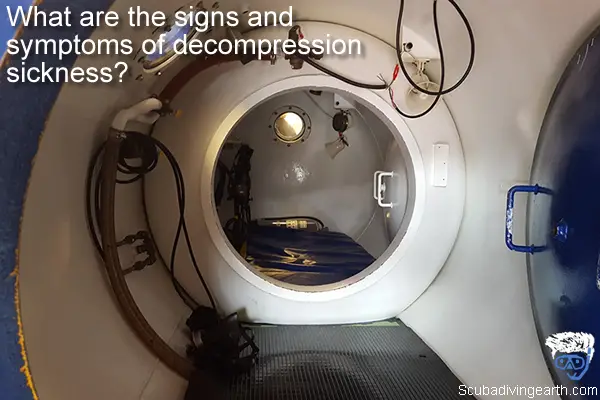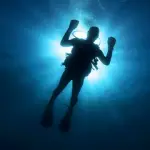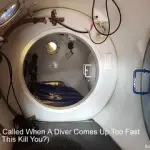
What is the most common manifestation of decompression sickness?
Joint and muscle pain is probably the most common symptom or manifestation of decompression sickness. This is due to bubbles typically forming in and around the joints. But if you are worried you may have decompression sickness, seek medical help immediately.
Symptoms of decompression sickness include:
- Joint and muscle pain.
- Tingling like pins and needles. This includes numbness or in more serious cases of decompression sickness, paralysis.
- A skin rash. The rash happens on the surface of the skin, which may be itchy or can be painful to the touch. Commonly referred to as a skin bend.
- Dizziness or vertigo. This includes feeling nauseous.
- Vomiting. This is usually as a result of nausea.
- Headache.
- Confusion. This includes having difficulty in thinking clearly and unusual behaviour.
- Extreme fatigue.
- Weakness in the arms or legs.
- Loss of hearing. This can include or ringing in the ears.
- Impaired vision. This can include the complete loss of sight.
- Coughing up blood.
- Shortness of breath.
- Difficulty urinating. This also includes constipation.
- Loss of bladder or bowel control.
- Unconsciousness.
- Uncontrollable shaking and shivering.
The best way to do more diving, but of course by avoiding decompression sickness, is to book yourself on a scuba diving liveaboard. You can check the latest and best deals on liveaboards using the following window:
What are the signs and symptoms of decompression sickness in more detail?
One of the most common manifestations of decompression sickness is joint and muscle pain, as well as a skin rash or itching which is referred to as a skin bend.
But be aware these first symptoms may just be the beginning of worse things to come and should never be ignored.
Medical advice should be sought if you think you may have decompression sickness or if you are starting to exhibit any of the symptoms listed below for decompression sickness or the bends.
Decompression sickness is one of the dangers of scuba diving, but when diving safely, this can be avoided (see below). Decompression sickness (DCS), or the bends, is a problem that scuba divers can suffer if they fail to decompress properly on an ascent from a dive.
DCS should be taken seriously, as in the most serious of cases of the bends it can lead to death of the casualty!
More Reading: Can You Die From The Bends? (Dysbarism Treatment)
If you’ve just been scuba diving and you are worried you may have come up too fast or missed a decompression stop. And perhaps if you are suffering from any of the above symptoms (or not), seek medical advice immediately.
No matter which decompression sickness symptom seek medical advice immediately
Whichever of the above symptoms you may be manifesting, be it join or muscle pain or perhaps what appears to be an innocuous skin rash, don’t be fooled, as this may be the early onset of any of the other more serious symptoms of DCS outlined above.
There are various stages of decompression sickness, and any symptom you may have should not be ignored.
How serious the decompression sickness may get or what symptoms may manifest, will be down to many factors. The main factors will be the length and depth of dive and how fast your ascent was from your dive.
Also, if your dive was a decompression stop dive (i.e. the dive requires you to carry out decompression stops on your way to the surface) and if you miss a stop, this is when you will be most at risk of DCS or the bends.
Of course, if you’ve just had a fast ascent from your dive, even where a decompression stop wasn’t required, this will also put you at high risk of decompression sickness too.

For decompression sickness – prevention is better than cure
As with all sicknesses, prevention is always better than cure. So in order to minimise the risk of getting decompression sickness, what should you do?
- Always descend and ascend slowly when you’re scuba diving. A fast ascent from depth is probably the biggest risk to scuba divers on recreational dives of getting decompression sickness!
- Never stay at the deepest depth of your dive for longer than is recommended by the relevant decompression tables or from what your dive computer indicates.
- Never miss a decompression stop if you’ve entered into no decompression stop time on your dive.
- Always perform a safety stop on all dives for thee minutes at 5-6 metres (16-20 feet).
- Never fly within 24 hours after diving.
- Avoid drinking alcohol before a dive if you can.
- Avoid hot tubs, saunas or hot baths immediately after a deeper dive. Better to leave it at least an hour or so after the end of your dive.
- Always drink plenty before you go diving to make sure you’re well hydrated.
- Get plenty of rest and an early night before you dive so you’re not tired and vulnerable to make silly mistakes.
- If you have a heart defect, like a hole in the heart (or Ventricular Septal Defect), or other medical condition, always seek medical advice before you go diving.
More Reading: How Deep Can You Dive Without Decompression (No Decompression Stop Limits)
Treatment for decompression sickness
If you have decompression sickness, the following steps should be taken:
- Never dive if you’re worried you have decompression sickness or until you’re given the all clear to dive again.
- Administer high-flow 100% pure oxygen as soon as possible after the dive.
- If the person isn’t feeling too nauseous, fluids may be given.
- The person should be put in the recovery position, which is with their left side down. Where possible, their legs should be slightly elevated.
- Get the casualty to a hyperbaric oxygen chamber as soon as possible. They will be put on 100% oxygen in the chamber.
More Reading: 12 Decompression Sickness Risk Factors In Scuba Diving and How to Avoid Them
Putting the casualty into a hyperbaric chamber will reverse the pressure changes that allowed gas bubbles to form in the blood stream in the first place.
The increased pressure inside the hyperbaric chamber will force the nitrogen back into its liquid form. They will be kept at pressure for a few hours and then brought back gradually to atmospheric pressure over a period of hours to allow the nitrogen to off-gas slowly and safely.
Hyperbaric treatment is best done within hours or as soon as possible after coming up too fast from a dive or if a decompression stop has been missed.
More Reading: What happens if you don’t decompress when scuba diving?
I hope you enjoyed this article about what are the signs and symptoms of decompression sickness
I’d love to hear from you. Tell us about your adventures of diving and snorkeling, in the comments below. Please also share your photos. Either from your underwater cameras or videos from your waterproof go-pro’s!
If this article hasn’t answered all of your questions. If you have more questions either about snorkeling or scuba diving (or specifically on what are the signs and symptoms of decompression sickness), please comment below with your questions.
There will also be many more articles about scuba and scuba diving safety tips (and on snorkeling too) for you to read and learn about this fabulous sport.
Have fun and be safe!
More Reading: Emergency Decompression Stop vs Safety Stop (What’s The Difference?)






I’d like to know how long it is possible to have symptoms of DCI. I went diving 4 months ago and have had many of these symptoms, some at first, and some still persisting such as daily headache, tingling in the arms and legs, and back pain (all new things for me). Long and short of it is there is nothing suspicious showing in scans and no medication has been successful at helping me with this.
Hi, firstly, I’d like to check that you did visit a doctor and seek medical advice when you had decompression symptoms in the first place? Also, did you get put into a recompression chamber?
I think the best thing you can do is to call a doctor immediately with what you describe and have some tests done, as I wouldn’t want to theorise about whether your symptoms are as a result of decompression sickness. Please come back and update me with what your doctor says, and I hope you get better too.